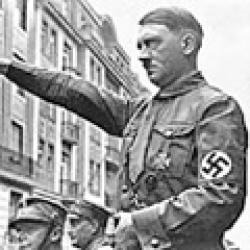
Published date
1 August 1936
The Berlin Games are infamously known as Hitler's Olympics after he used the event for propaganda to promote his National Socialist German Workers' Party (Nazi) and white supremacist ideology.
Berlin won the bid to host the Games on 26 April 1931, before the Nazis came to power, beating Barcelona in the competition to host the games. Forty-nine athletic teams totaling 409 athletes from around the world competed in the Berlin Olympics, making it the largest of the eleven modern Olympiads held since 1894. For Hitler's propaganda minister Joseph Goebels, it was a huge opportunity to demonstrate the Nazi ideology of Aryan race superiority and Germany fielded the largest team with 348 athletes. The confrontation with Nazi ideology come to a head in the long jump competition between Lutz Lang, the leading German athlete of his day, and America's Jesse Owens. With his blonde hair, blue eyes and lean athletic body, Lang personified Hitler's Aryan vision. Owens on the other hand was an African America, one of ten in the US team. Lang and Owens had become friends during the competition and when Owens beat Lang, Lang was the first to congratulate him. Hitler refused to place the gold medal around Owen's neck. Owens' gold medal in the long jump was one of four he won in Berlin, the others being in the 100m, 200m, 4 x 100m relay. The ten African-Americans on the US team won 7 gold medals, 3 silvers and 3 bronze medals between them.
More positively, the games were also noted for their technological achievements. Events were televised on a closed-circuit system throughout the Olympic village and to public halls and theaters throughout the country and newsreel footage was widely distributed. Radio remained the most widely used medium and the Nazis made available twenty transmitting vans to the foreign media along with 300 microphones. Radio broadcasts at the Olympics were given in 28 different languages.
South African, still a British colony at the time, competed as an independent nation, along with Australia, Bermuda, Canada, and New Zealand. (Sidney) Robey Leibbrandt, a South African Olympic boxer in 1936, was later condemned to death (but reprieved) because of his Nazi sympathies. Leibbrandt died exactly 30 years after the opening of the Berlin Games, on 1 August 1966.
The Berlin Olympics were the last to be held for the next twelve years.
Sources:
Wallis, F. (2000). Nuusdagboek: feite en fratse oor 1000 jaar, Kaapstad: Human & Rousseau.
The Nazi Oympics, Berlin 1936: Special Exhibition (2008). Website: ushmm.org